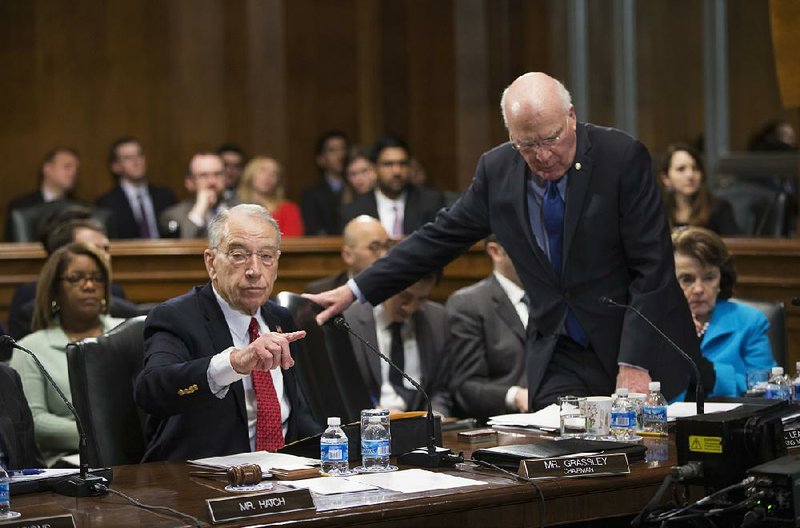WASHINGTON -- Congress on Wednesday sent President Donald Trump legislation blocking a President Barack Obama-era rule designed to keep guns out of the hands of certain mentally disabled people.
RELATED ARTICLES
http://www.arkansas…">Illegal leaks felled Flynn, Trump says http://www.arkansas…">Labor choice drops out http://www.arkansas…">U.S. shifts on Mideast 2-state bid http://www.arkansas…">Magnet schools get DeVos' vow of help http://www.arkansas…">IRS rescinds health-law instruction http://www.arkansas…">Immigrant's arrest protested in Seattle http://www.arkansas…">Raise military spending, Mattis tells NATO allieshttp://www.arkansas…">Retail sales up 0.4% in January; Trump touts a tax overhaul
On a vote of 57-43, the Senate backed the resolution, just one of several early steps by the Republican-led Congress to undo regulations implemented by Obama. The House passed the measure earlier this year. The White House has signaled that Trump will sign the legislation.
Sens. John Boozman and Tom Cotton, both Republicans from Arkansas, backed the measure.
The Obama rule would have prevented an estimated 75,000 people with mental disorders from being able to purchase firearms. It was crafted as part of Obama's efforts to strengthen the federal background check system after the 2012 massacre of 20 young students and six staff members at Sandy Hook Elementary School in Newtown, Conn.
[PRESIDENT TRUMP: Timeline, appointments, executive orders + guide to actions in first 100 days]
Adam Lanza, a 20-year-old man with a variety of impairments, including Asperger's syndrome and obsessive-compulsive disorder, fatally shot his mother at their home, then went to the school where he killed the students, adults and himself.
The Obama administration rule required the Social Security Administration to provide the names of beneficiaries with mental impairments who also have a third party manage their benefits.
But lawmakers, with the backing of the National Rifle Association and advocacy groups for the disabled, opposed the regulation and encouraged Congress to undertake a rarely successful process designed to void regulations that are a concern to Congress.
With a Republican ally in the White House, the GOP has moved aggressively on several fronts to rescind some of the Obama administration's final regulations on the environment, financial reporting and, now, guns. Under an expedited process established through the Congressional Review Act, a regulation is made invalid when a simple majority of both chambers passes a joint resolution of disapproval and the president signs it.
The House also voted to repeal three Labor Department regulations Wednesday, including a rule that established when states could require drug testing for certain laid-off workers seeking unemployment insurance. Critics seeking the repeal said the department crafted the regulation so narrowly that it undermined congressional intent to give states more leeway to use drug testing in their unemployment insurance programs.
On the gun rule, Sen. Charles Grassley, R-Iowa, spearheaded the repeal effort and said the regulation unfairly stigmatizes the disabled and infringes on their constitutional right to bear arms. He said the mental disorders covered through the regulation are filled with "vague characteristics that do not fit into the federal mentally defective standard" prohibiting someone from buying or owning a gun.
Grassley cited eating and sleep disorders as examples of illnesses that could allow a beneficiary to be reported to the background check system if he also has third-party management of his benefits.
"If a specific individual is likely to be violent due to the nature of their mental illness, then the government should have to prove it," Grassley said.
Sen. Chris Murphy, D-Conn., said he didn't know how he could explain to his constituents that Congress was making it easier rather than harder for people with serious mental illness to have guns.
Murphy asked, "If you can't manage your own financial affairs, how can we expect that you're going to be a responsible steward of a dangerous, lethal firearm?"
Sen. Ron Wyden, D-Ore., argued that people who think they're treated unfairly can appeal, and are likely to win if they're not a danger to themselves or others. But Grassley said federal law requires a formal hearing and judgment before depriving someone of a firearm because of mental illness.
Gun-rights groups weren't the only organizations upset about the Obama administration's regulation. The American Civil Liberties Union criticized it, too. The ACLU said the rule advanced a harmful stereotype that people with mental disabilities, "a vast and diverse group of citizens, are violent." More than a dozen advocacy groups for the disabled also opposed the Obama administration's regulation.
The NAACP, the United States Conference of Mayors and the National League of Cities supported the Social Security Administration's efforts.
"This heartless resolution puts the most vulnerable Americans at risk," said Dan Gross, president of the Brady Campaign to Prevent Gun Violence. "Make no mistake, this vote was really about deepening the gun industry's customer pool, at the expense of those in danger of hurting themselves or others."
A Section on 02/16/2017
